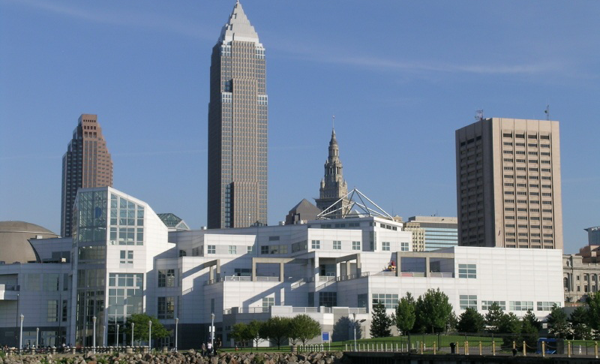Everything Looks Good, Except It's in Cleveland
That was my feeling as CWRU rose to the top of my list of potential graduate schools. This was the early 1970s, not a good time for Cleveland. The city kept making headlines because things kept catching fire. The Cuyahoga River caught fire. Great swaths of the inner city caught (or were set on) fire. Even Mayor Ralph Perk's hair caught fire. Why would I want to live in a city that kept bursting into flame?

In fact, I had to ask myself why I would want to live in any city. To that point the largest community I'd lived in had had 18,000 people, fewer than some Cleveland neighborhoods. I'd gone to an undergraduate college of 2,000 in a village of 5,000 in the heart of northern New York's dairy country. I was a naive rural sprout if ever there were one. My nearest cities were in a foreign country (Canada, which many claim isn't much different from the U.S., but don't tell that to a Canadian). And when my parents kindly traveled to Cleveland to find me an apartment while I was tied up with a summer job, returning home to report that the motel they'd stayed in, perilously close to campus, was really a brothel, I had to ponder whether I'd made the right choice. I pressed bravely on, persuading myself that I would learn something in this strange new environment.
Upon arrival in Cleveland, I discovered that everyone locked their doors. This was a shock to me; where I was from, we locked our cars and houses only in late summer so our neighbors couldn't sneak their excess zucchinis inside. And so I learned not to trust people.
From the Cedar Hill dorms, where I was a residence director, I could hear gunshots; the only gunfire I'd heard until then had been from deer hunters, not gym shoe hunters. One of my residents had his car stolen, almost literally under our noses. And so I learned to be afraid.
I was used to smiling and offering a greeting to anyone I crossed paths with, a favor that was routinely returned in the small towns of my youth. But the first few times I tried that in Cleveland, I got looks that said, "Get away from me, you pervert!" And so I learned to be unfriendly.
And then there was the weather. Winter to me, the product of a latitude equivalent to northern Minnesota's, was cold, sunny days with lots of clean white snow on the ground. Used to days at a stretch that never rose above zero, I wondered why the fuss when the temperature dipped into the teens overnight. Even as late as Valentine's Day my first year, I kept asking, "When does winter start?" All I got in reply were annoyed, quizzical looks. And so I learned that winter, far from a time of beauty, was an interregnum of soggy gray skies and soggy gray snow between the useful seasons, and that one was expected to complain and act depressed about it. So I did, but I was the only person I knew who did so because it was too warm.
But it wasn't all bad. In the fall of 1972, I handed out leaflets for Democratic presidential candidate George McGovern at Euclid and 105th; the only white person in sight, I learned what it felt like to be a minority, if only for a few hours. I met my wife-to-be in the Cleveland Friends Meetinghouse just off University Circle, and learned the joy and comfort of what would become a lifelong relationship. We acquired season subscriptions to the Cleveland Symphony, and I learned how much more glorious classical music sounds live than on a CD (or a "record" in those days). I could go on; fundamentally, I learned that the world is not everywhere as it was in our childhoods, nor is it always as we wish it to be. I learned to take the bad with the good.
Oh yes, I also earned two graduate degrees, which have served me well, if not as I intended.
Still a country boy at heart, I've been back to Cleveland only a handful of times since I left in 1976. I understand it's undergone a renaissance of sorts. In recent years it's made the news for new stadiums, the rock-n-roll museum, the resurrection of The Flats and, most recently, a celebration of a cleaner and presumably fire-resistant Cuyahoga River, an anti-pyrrhic victory at its most promising. Perhaps it's not "the mistake by the lake" (a slogan I never felt was fair) anymore. Regardless, I've come to see that it was not a mistake for me to further my education by the lake, both on campus and off.
Neal Burdick earned his M.A. and Ph.D. in American Studies in 1975 and 1981 respectively. He is publications writer/editor at his undergraduate alma mater, St. Lawrence University in Canton, New York, and a freelance writer and magazine and book editor.

